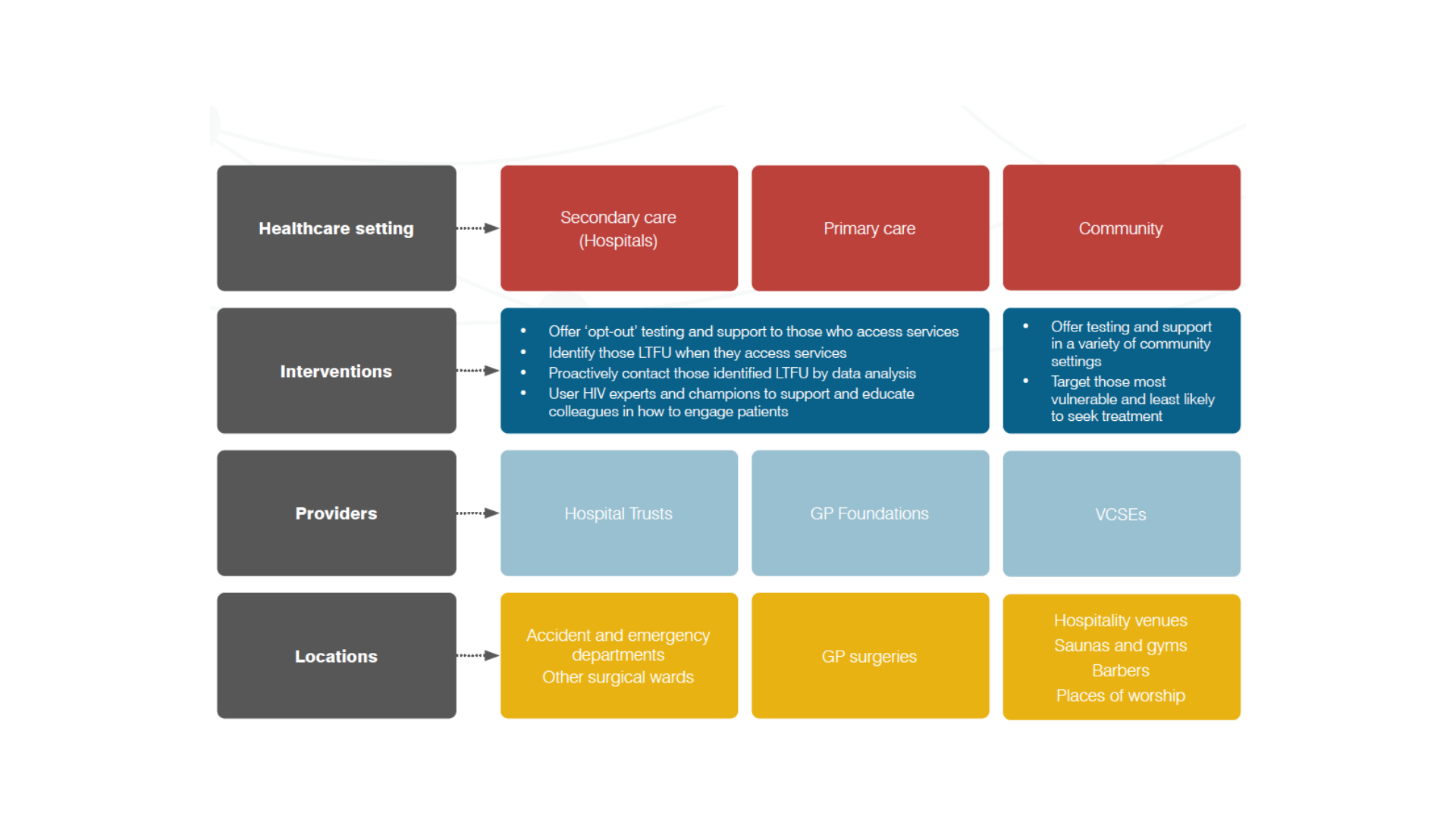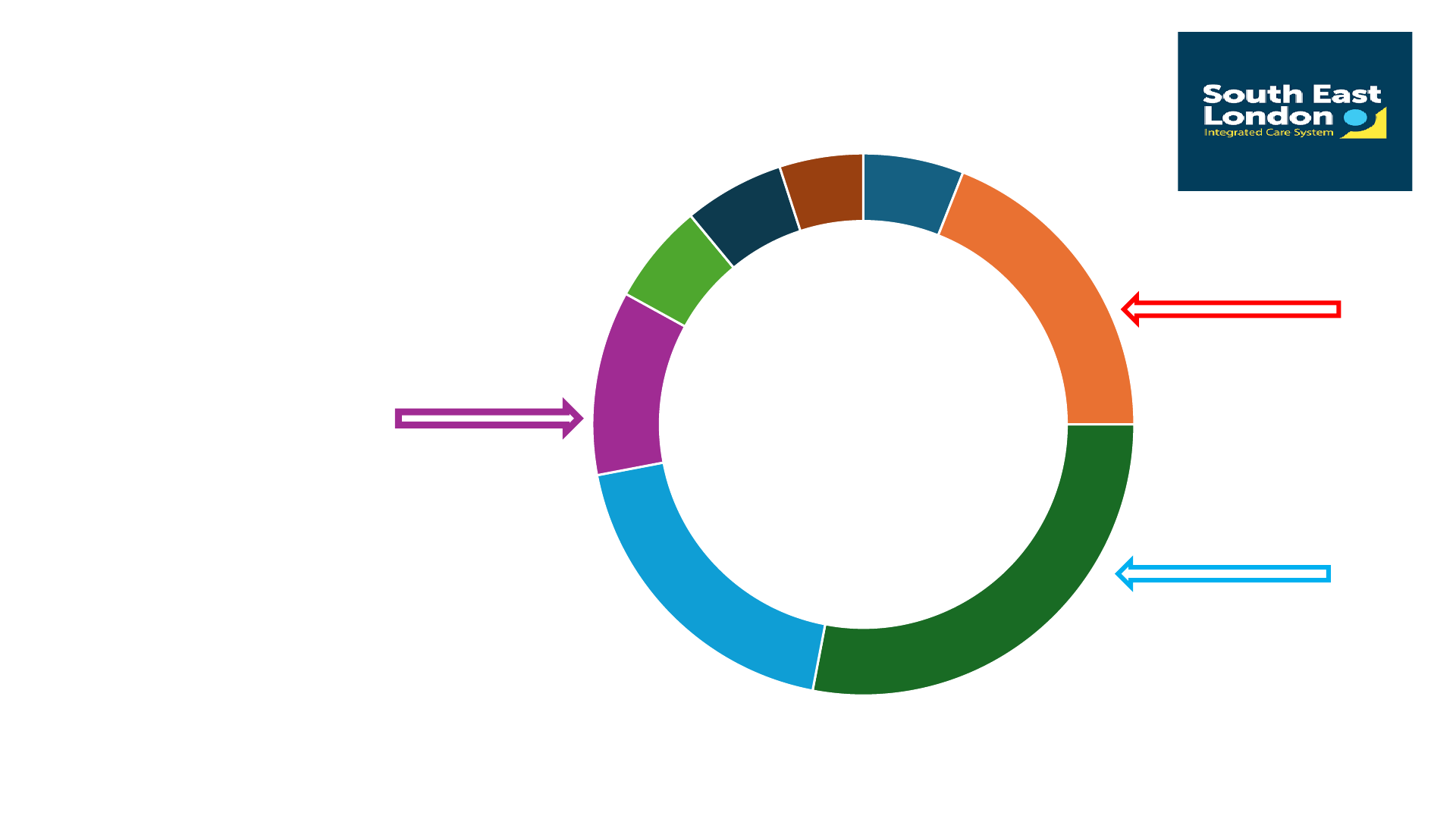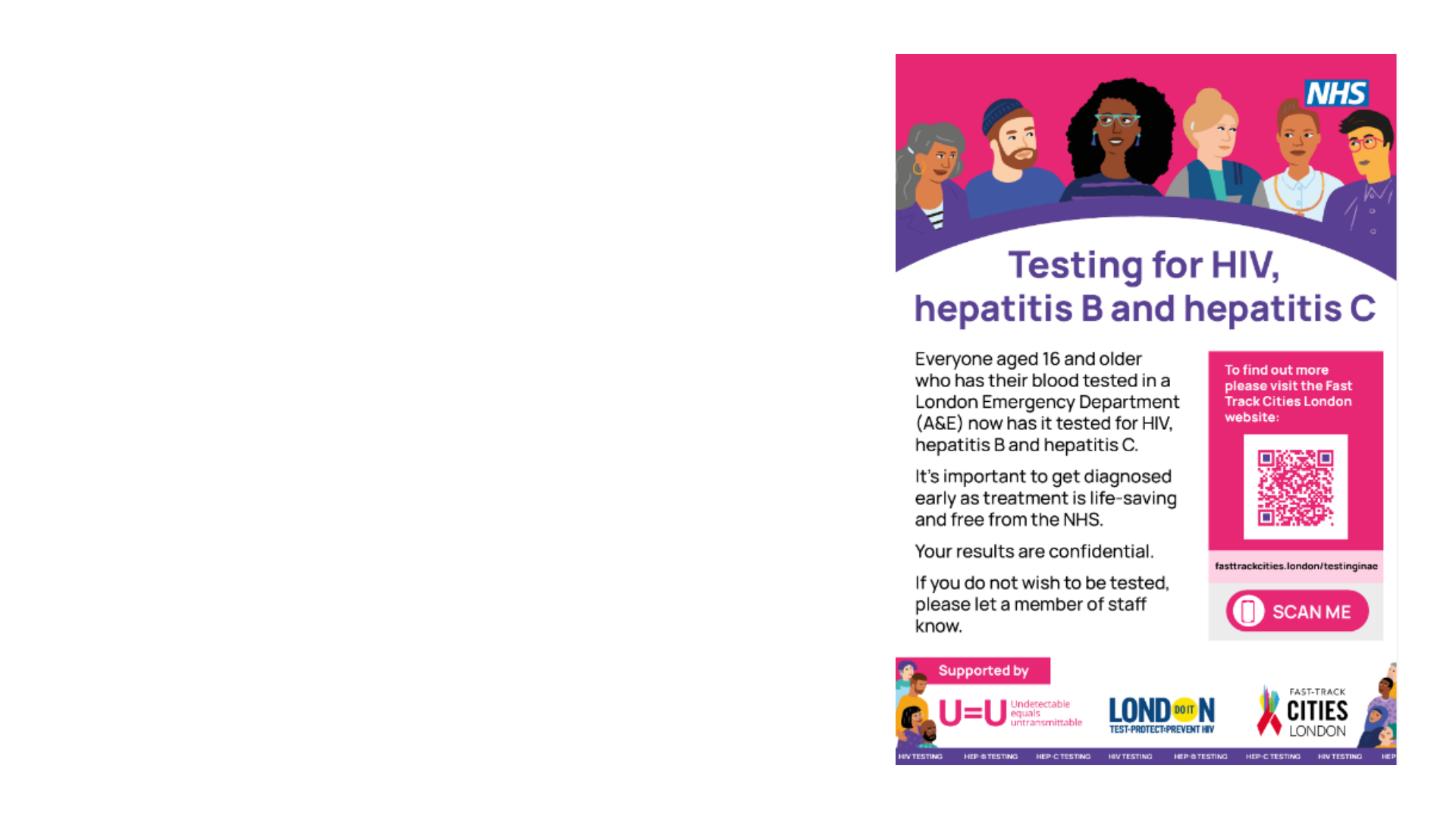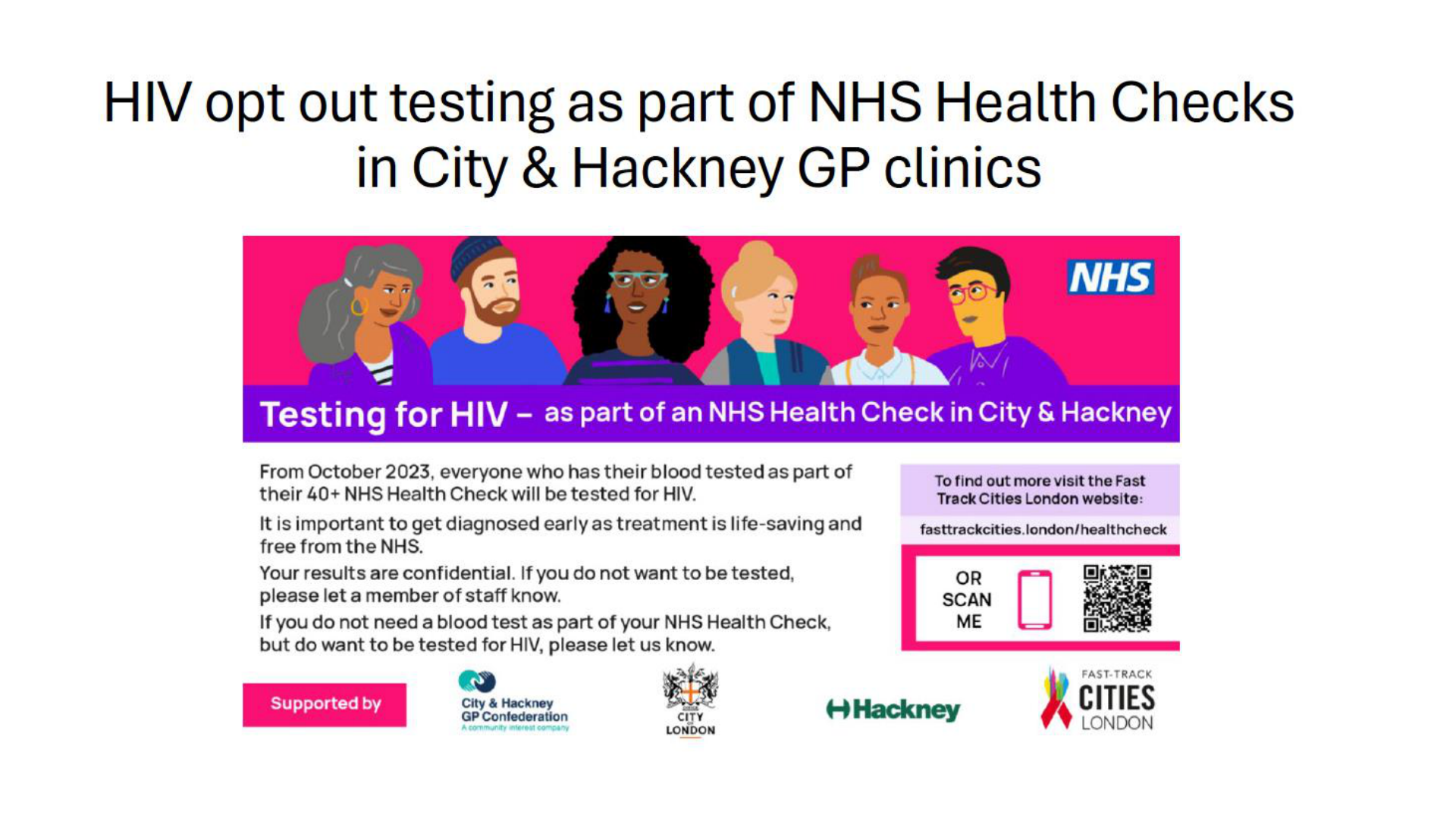
Closing Gaps across the HIV Treatment Continuum
95-95-95 Targets Update 2024
Jane Anderson PhD; FRCP
Co-Chair Fast-Track Cities London,
Consultant Physician, Homerton Healthcare
NHS Foundation Trust London UK

London’s HIV Landscape
8.8 Million people
5 Integrated Care Boards
33 local boroughs
44 acute hospitals
28 HIV clinical centres
50+ HIV Voluntary organisations
1,500 + Primary care organisations
16 Community and Specialist Trusts
Multiple HIV related funding streams
37,300 Londoners live with HIV
=
40% of people living with diagnosed HIV in England
Thank you UKHSA for the data and diagram
2024-07-22 IAPAC 95-95-95 2

New HIV diagnoses first made in England [note 1] by region of
residence: England, 2013 to 2022
3
[Note 1] Excludes people previously diagnosed abroad - less than 0.5% of new HIV diagnoses were first diagnosed in the UK outside England
HIV in England: 2023 slide set (version 1.0, published 3 October 2023)

UNAIDS Targets: How is London Doing?
In 2022
96% of people who
live with HIV know they
have HIV
98% of those
diagnosed are receiving
HIV treatment
97% of those who are
treated have viral loads
so low that HIV is
undetectable
2024-07-22 IAPAC 95-95-95
4
Fast Track progress: London, 2017-2022
Data courtesy of UKHSA https://www.gov.uk/government/publications/hiv-london-annual-data-
spotlight
2024-07-22 IAPAC 95-95-95 4

2024-07-22 IAPAC 95-95-95 5
Diagram Dr. Kate Childs Kings College Hospital with thanks.
Haidari G, Harrop K, Lovatt I, Rosenvinge M, Wood L, Ratnappuli A, Mower R, Alexander H, Childs K. (2024) Integrated Care System (ICS) funding for re-engaging patients no longer in care
-an important new area for HIV commissioning. BHIVA Spring Conference 2024. https://www.bhiva.org/SpringConference2024Presentations
Two-way path: moving backwards through the treatment cascade

Gap: People Living with HIV who are not engaged in care
• The UNAIDS Cascade calculation does not count
• people who are diagnosed and not in care
• people for whom information relating to treatment and viral load
is missing.
• Total numbers of people living with HIV who are
not retained in care is greater than previously
thought
• Impact of Covid
• More sophisticated data collection
• e.g. Clinic dashboards and definitions
• Testing interventions re-diagnosing and re-
engaging
• Elton John AIDS Foundation work in SE London
2024-07-22 IAPAC 95-95-95 6

2024-07-22 IAPAC 95-95-95 7
Action 7: we will boost support to people living with HIV to increase the
number of people retained in care and receiving effective treatment

Defining and Measuring Engagement in Care
• People are mobile.
• Life is complicated
• The world can be a harsh place
• Clinics are open access.
• Data collection and management
challenges
➢UKHSA send information relating to
people who had a minimum 15-month gap
since last consultation within the last 5
years and not seen again to HIV care
providers.
2024-07-22 IAPAC 95-95-95 8
https://www.gov.uk/government/publications/hiv-monitoring-and-evaluation-framework/hiv-action-plan-monitoring-and-evaluation-framework-2023-report#main-
messages
Martin V, UKHSA (2024) Monitoring people not retained in care and subsequent re-engagement BHIVA Spring Conference. Oral presentation 001
Current care standards recommend that
people living with HIV should attend
specialist HIV care annually.
Not engaged = those not seen within 15
months of their last attendance.

Why does this matter?
• Avoidable HIV related morbidity and
mortality: Higer rates of HIV associated
hospital admissions amongst diagnosed
people not accessing care than amongst
people newly diagnosed
1
• Costs to health and care systems
1
• Confounds planning
• Increases the proportion of people who
have transmissible HIV : of people in
England with transmissible HIV
• One third = undiagnosed people
• Two thirds = people who are not
engaged in care
2
2024-07-22 IAPAC 95-95-95 9
1.Childs K. People living with HIV not in care: time to act!
https://www.bhiva.org/file/645ba42c7a8c8/Kate-Childs.pdf (PDF slides)
2. Martin V (presenter Brown A.) Estimating the number of people living with transmissible HIV in England in 2020. British HIV Association Spring Conference 2022,
Manchester, abstract no O05.2

British HIV Association Standards of Care
STANDARD 3b
“Services should have mechanisms in
place to ensure all people living with HIV
are retained in specialist care”
• HIV services should have mechanisms to
identify and follow up people registered
with their service, who become disengaged
from care, who miss appointments orrun
low on medication.
• HIV services should have mechanisms in
place to explore the reasons for
disengagement when people living with HIV
re-engage with services and where possible
address identified reasons for
disengagement.
2024-07-22 IAPAC 95-95-95 10
https://www.bhiva.org/standards-of-care-2018

Elton John AIDS Foundation Social Impact Bond
• Southeast London
• Combined interventions- opt out testing,
engaged clinical teams, primary care
• 824 people living with HIV potentially lost
to follow up re-engaged 153 people of this
cohort.
• 71% were from Black African, Black
Caribbean and Black ‘other’ communities.
• > 50% women.
• 44% of those re-engaged lived in the most
deprived 20% areas (based on the Index
of Multiple Deprivation).
2024-07-22 IAPAC 95-95-95 11
https://www.kcl.ac.uk/research/service-evaluation-elton-john-aids-foundations-zero-hiv-social-impact-bond-intervention-south-london
Angell R, Clark K: People living with HIV and not in care. Terrence Higgins Trust (2024) https://www.tht.org.uk/about-us/what-we-do/our-campaigns/re-engaging-people-hiv-
care

2024-07-22 IAPAC 95-95-95 12
Stanworth N; The Zero HIV Social Impact Bond: The impact of the COVID-19 pandemic . https://golab.bsg.ox.ac.uk/knowledge-
bank/resource-library/the-zero-hiv-social-impact-bond-the-impact-of-the-covid-19-pandemic/
EJAF SIB : What happened, where and by who?

2024-07-22 IAPAC 95-95-95 13

Following on: S.E London Project
2024-07-22 IAPAC 95-95-95 14
Haidari G, Harrop K, Lovatt I, Rosenvinge M, Wood L, Ratnappuli A, Mower R, Alexander H, Childs K. (2024) Integrated Care System (ICS) funding for re-engaging
patients no longer in care -an important new area for HIV commissioning. BHIVA Spring Conference 2024.
https://www.bhiva.org/SpringConference2024Presentations
✓ Dedicated ‘re-engagement team’
at each trust
✓ Used a range of methods to
contact people
✓ Data collected on standardised
fields similar to EJAF pilot
✓ Included the barriers to re-
engagement and sought to identify
the main barrier for each patient
Re-engaged 88 patients over 12 months
• 52% female
• 48% male
67% Black African/Black Caribbean/ Black
British/Black other
30.5% White/White British
2.5% other
Median age = 49 years
CD4 (Mean): 247 cmm
3
CD4 < 200: 41%

Re-engagement profile
15
Haidari G, Harrop K, Lovatt I, Rosenvinge M, Wood L, Ratnappuli A, Mower R, Alexander H, Childs K. (2024) Integrated Care System (ICS) funding for re-engaging patients
no longer in care -an important new area for HIV commissioning. BHIVA Spring Conference 2024. https://www.bhiva.org/SpringConference2024Presentations
• Median time out of care = 20 months ( longest-122 months)
• Number of years since diagnosis of HIV
• 57% >10 years
• 19% 5-10 years
• 19% 2-5 years
• 5% newly diagnosed in the last 2 years
• 81% (72/88) of re-engaged already identified on the clinical our database
• 74% (65/88) of patients re engaged via the dedicated teams
• 7 (8%) self-presented
• 6 (7%) referred by other teams
• 6 (7% ) via GP
2024-07-22 IAPAC 95-95-95

Barriers to
Engagement
16
Haidari G, Harrop K, Lovatt I, Rosenvinge M, Wood L, Ratnappuli A, Mower R, Alexander H, Childs K. (2024) Integrated Care System (ICS) funding for re-engaging patients
no longer in care -an important new area for HIV commissioning. BHIVA Spring Conference 2024. https://www.bhiva.org/SpringConference2024Presentations
Abroad
6%
Mental Health
19%
Stigma…
Not Known
19%
Social Factors
11%
Drug use
6%
Alcohol
6%
Other
5%
2024-07-22 IAPAC 95-95-95

Opt-out Emergency
Department BBV testing
• 34 hospitals
• 4 cities
• Active with ED BBV opt out testing for
≥2 BBVs
• All 28 Type 1 EDs in London offer
triple BBV opt out testing
• 3 million ED attendances with blood
tests
2024-07-22 IAPAC 95-95-95 17

Emergency Department Opt-Out Testing
London Sites April 2022 – March 2024 (24 months)
18
Number of tests:
HIV, HBV surface
antigen, HCV
antibody
New diagnoses
Previously
diagnosed,
not in care
Previously
diagnosed,
in care
HIV
1,586,121 676 446 9,426
Hepatitis B
1,134,295 3,095 616 2,556
Hepatitis C
current infection
(RNA+)
1,177,128 881 158 269
Total
3,897,544 4,652 1,220 12,251
This data is from the NHS England ED BBV opt out testing dashboard which receives aggregate data on testing, care status and linkage to care from all sites
participating in ED testing on a monthly basis. Data is not linked to patient identifiers and is not routinely deduplicated. Dashboard data is subject to verification
by UKHSA.
2024-07-22 IAPAC 95-95-95

Emergency Department Opt-Out Testing Linkage to care:
London Sites April 2022 – March 2024 (24 months)
19
This data is from the NHS England ED BBV opt out testing dashboard which receives aggregate data on testing, care status and linkage to care from all sites
participating in ED testing on a monthly basis. Data is not linked to patient identifiers and is not routinely deduplicated. Dashboard data is subject to verification
by UKHSA.
New diagnoses
linked to care
Previously diagnosed
not in care, linked to care
Total linked to care
HIV
562 188 750
Hepatitis B
1,941 1,941
Hepatitis C
current infection
(RNA+)
568 50 618
Total
3,309
2024-07-22 IAPAC 95-95-95

2024-07-22 IAPAC 95-95-95 20
ED BBV Testing England April 2022 to June 2024
Data Courtesy of Ian Jackson NHS England (
London)

2024-07-22 IAPAC 95-95-95 21
Slide courtesy of Dr Rachael Hill-Tout

People living with HIV
NHS England
London Councils
UKHSA
OHID
Mayor of London
Primary care
ICBs
Voluntary Sector
HIV clinicians
Directors of Public Health
2024-07-22 IAPAC 95-95-95 22

FTC London approaches to tackling stigma
The
Individual
Places/environments
Wider society
Changing public perceptions of HIV –
HIV Confident Charter &
HIV Ambassadors Programmes
Tackling self stigma through peer support, building
resilience and participation in society –
Empowerment Programme & Getting to Zero
Creating HIV-friendly services: NHS, statutory &
public sector –
HIV Confident Charter &
HIV Ambassadors Programmes
2024-07-22 IAPAC 95-95-95 23

Stigma Programme
• Empowerment: Community of Practice created framework and established a £325k fund from
April 2022 – March 2023 for six project to tackle self-stigma, working with diverse communities
across London
• HIV Ambassadors: Three-year £235k programme from April 2023 in partnership with Terrence
Higgins Trust, recruiting & training PLHIV to share their personal experiences and educate
society about HIV
• ‘HIV Confident’ charter mark: Three-year £360k programme from April 2023 in partnership with
National AIDS Trust, Positively UK and AIDSMAP. Providing toolkits & online training to multi-
sector organisations to gain achieve charter mark, tackling place-based stigma
24
2024-07-22 IAPAC 95-95-95

London’s HIV Confident Initiative
2024-07-22 IAPAC 95-95-95 25

Getting to Zero Improvement Collaborative, 2024-26
A third sector partnership, working with the NHS
• Aim 1: Embed a peer support network in clinics across
London
• Aim 2: Improve the quality of life and wellbeing of
people living with HIV
• Aim 3: Re-engage people diagnosed with HIV who are
no longer accessing care or treatment
Programme evaluation undertaken by the Tavistock
Institute
262024-07-22 IAPAC 95-95-95

Advice, support, re-engagement in care and Peer Support
2024-07-22 IAPAC 95-95-95 27
Living Well: Psychological Support
Positively UK: Welfare benefits advice
Positive East: Housing and benefits advice
THT: Re-engagement in care coordinator,
Chemsex support
Food Chain: Nutritional advice/support
4M Network: Mentor mother support
AAF: Reaching African communities
THT/Metro/PUK/PE:
‘Learning to live well with HIV’ courses
Photo 104381386 | Help Advice Support © Etiamos | Dreamstime.com
Getting to Zero Improvement Collaborative, 2024-26
In-clinic peer support
Metro: SWL/SEL
Positive East: NEL
Positively UK, Plushealth,
NAZ, Sophia Forum:
NCL/NWL

Getting to Zero Collaborative
Assessing and improving Quality of Life
• Specifically designed standardised Wellbeing
Assessment Tool
• Understanding impact and outcomes
• Tool will cover the range of issues
contributing to disengagement from care.
• Monitoring and understanding onward referrals
• Identify unmet needs
• Facilitate signposting to VSO services via the
Collaborative and beyond
28
2024-07-22 IAPAC 95-95-95
Illustration 174225197 © Irina Miroshnichenko | Dreamstime.com

Primary Care Champions Pilot, 2024
16 General Practitioners across the five London
ICSs
Key objectives :
• Improve HIV awareness and tackle stigma in
primary care
• Improve health and well-being for people living
with HIV
• Improve collaborative working between primary
and secondary care, as well as the HIV voluntary
sector (via in-clinic peer support workers)
• Increase testing for HIV in primary care
292024-07-22 IAPAC 95-95-95

Closing the Gap: Implementing what works
• Leadership and commitment
• Whole system approach
• Focus: with special attention to the
most vulnerable
• Resources: sufficient and sustained
resources
• Monitoring: data and intelligence
• Responsive, agile, flexible
• “Re-engagement works but its
extremely labour intensive”
2024-07-22 IAPAC 95-95-95 30
Action 7: we will boost
support to people living
with HIV to increase the
number of people retained
in care and receiving
effective treatment

Call to Action
2024-07-22 IAPAC 95-95-95 31

